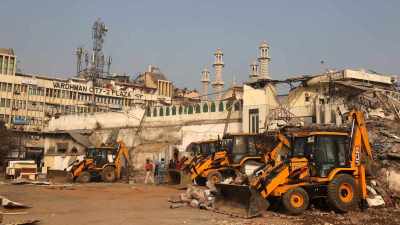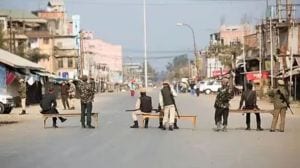Pygmies as king makers
The case of President K.R. Narayanan for a second term was weakened when former president, R. Venkataraman, sent him this message: if you co...

The case of President K.R. Narayanan for a second term was weakened when former president, R. Venkataraman, sent him this message: if you contest and lose, the defeat will not be Narayanan8217;s but that of the president of India. Narayanan8217;s own inclination was no different. He was willing to be a consensus candidate but was clear that he would not stand otherwise.
Prime Minister Atal Bihari Vajpayee was at least frank when he let Narayanan know that the National Democratic Alliance NDA was not in favour of a second term for the president. This was before Narayanan went to Kerala for his Ayurvedic treatment. The prime minister had reportedly said that the precedent was against repeating the same person for the office of the president.
This, in fact, is not correct because Rajendra Prasad, chairman of the Constituent Assembly, was given another innings. Prime Minister Jawaharlal Nehru was against him 8212; but for other reasons. The two had crossed swords over the Hindu Code Bill. Maulana Abul Kalam Azad, among the tallest Indian leaders of the time, argued with Nehru that Prasad was equal to any in stature. If he wanted a second term, they could not refuse it to him.
Nehru was unconvinced. He constituted a committee under the chairmanship of his loyal cabinet minister, T.T. Krishnamachari. The Maulana was purposely kept out of it. When the committee met in a room in the Parliament House, the Maulana got wind of it and reached the venue. The committee members were somewhat embarrassed by his presence but dared not object to it. As a result, Dr Rajendra Prasad8217;s name was unanimously adopted and conveyed to Nehru.
Precedent or no precedent, the BJP 8212; which leads the NDA 8212; is unhappy with President Narayanan on two counts. One, he had asked the Vajpayee government to take a vote of confidence in the Lok Sabha when there was no such motion brought by the Opposition. Two, the president had expressed his anguish over the Gujarat carnage a day before it was to figure in Parliament. Currently, the political scenario is too fractured to give one party the option to nominate the next president. Nor is there any tall leader like the Maulana on the scene. The pygmies who have limited vision and parochial agendas have got together to govern the country.
It is the NDA which made a mess of the whole thing. It was a case of too many cooks spoiling the broth. What could have been a straight, clean arrangement was spoilt by too many voices 8212; and dissensions 8212; in the 24-member NDA. Poor P.C. Alexander! He has been utterly humiliated in the process.
Even if the NDA had its own compulsions, why did it have to wash its dirty linen in public? Why was a person who had done his job well dragged in? That busybody, Union Minister of Parliamentary Affairs Pramod Mahajan, has done the most damage. Mahajan had assured the Shiv Sena that he had sewn up everything in favour of Alexander. Since he was being sponsored by the Shiv Sena, Alexander was acceptable to the BJP and Home Minister L.K. Advani had even rung him up to congratulate him.
In a parallel move, Mahajan went to Andhra Pradesh to persuade Chief Minister Chandrababu Naidu to accept Alexander because even the prime minister wanted him. Naidu favoured a consensus candidate and argued that there was opposition to Alexander8217;s name even within the NDA.
The BJP could not afford a split when the Electoral College for the President 8212; comprising elected members of the two Houses of Parliament and State Legislatures 8212; indicated that abstention on the part of Naidu8217;s Telugu Desam could possibly tilt the balance against it, especially if other parties followed its example. Naidu8217;s preference was for Krishna Kant, in whose elevation to the post of vice-president he had had a hand. But certain elements in the BJP were opposed to Kant because he was once associated with the Third Front.
It is strange that no account was taken of the manner in which Vice President Krishna Kant has kept the dignity of the House. Nor was there any recognition of his long years of selfless services to the country and his family8217;s participation in the struggle for India8217;s independence. He should at least continue as vice president.
However, I have not liked the distribution of a glossy booklet, Welcome Mr Chairman, Sir. It comprised a collection of speeches delivered to felicitate Kant on his election as vice president in 1997.
Najma Heptullah, deputy chairperson of the Rajya Sabha, has the dignity and acumen to fill the vice presidential post too. She handles the House extremely well. But her own Congress Party has not been enthusiastic about her candidature. Last time the party had even opposed it. This time, however, her case has been greatly weakened by the fact that a Muslim has been selected to be the president.
What strikes you about Abdul Kalam is his humility. He has occupied high positions in the science and defence world but has remained a simple, unassuming person. Even as defence advisor, he occupied only one room in Delhi8217;s Khel Gaon. Rashtrapati Bhavan is too big a mansion for him and he may have to think of ways of utilising the accommodation it affords.
But the BJP 8212; Vajpayee had indicated that Kalam was his choice three or four months ago 8212; has not selected him for his austerity. It has other considerations.
After the shame of Gujarat, which has tarnished India8217;s image as a secular, tolerant country, his presidentship was meant to send a message to the world. And that message may somewhat retrieve India8217;s old image. But the ultimate success of the message sought to be sent will, however, not depend so much on Kalam as on the BJP, which still wants to saffronise society.
In fact, some opposition parties are in two minds about Abdul Kalam8217;s candidature because they fear that he may become the BJP8217;s rubber stamp.
But one thing that may not go down well in a world that views India8217;s nuclear status with apprehension is that Kalam is also known as Mr Missile Man in the land of Gandhi.
- 01
- 02
- 03
- 04
- 05






























